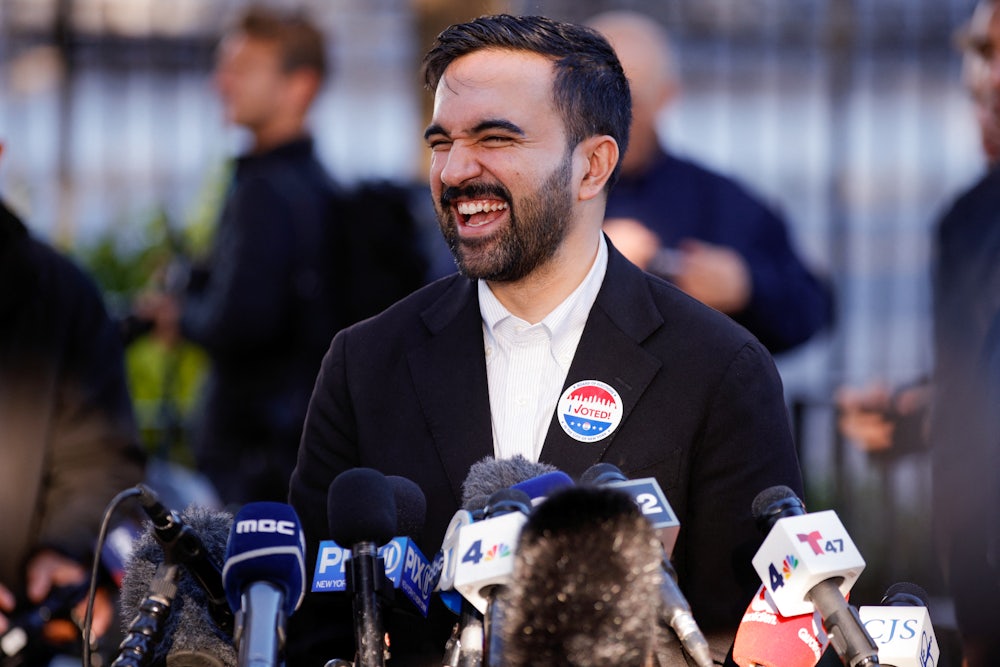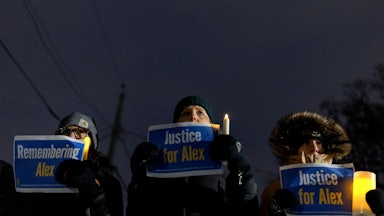In the coming days, weeks, and months, moderate Democrats and their allies in the media will try to convince you that Zohran Mamdani’s improbable victory on Tuesday does not matter. They will say that New York City is not like the rest of the country. A 34-year-old Muslim democratic socialist with little political experience can win the mayoralty there, sure, but could he win anywhere else? Mamdani’s campaign may have been built on a series of tactile, eminently achievable, and frankly small-scale promises—free buses, rent freezes for one million tenants, a housing agenda straight out of Abundance—but they will say it is all a fantasy. They will celebrate when he hits inevitable roadblocks, and when President Trump sends in his goons, some will say, “I told you so.”
Make no mistake: They are afraid of Mamdani. But they fear him for the wrong reasons. They are already anticipating millions of mailers featuring his bearded face. Every Republican in the country will tell voters that a vote for any Democrat is, deep down, a vote to turn the nation into Mamdani’s New York City—a vote for socialism, terrorism, and crime. For a party that is doing what it almost always does when it’s out of power—tacking to the right, promising voters less, and running cookie-cutter candidates of little substance—this is a frightening proposition. But it’s not why party leaders and their mouthpieces in the press should really be worried.
They should be panicked because Mamdani is not a warning shot; he is a sign of things to come. Democratic voters everywhere want radical, transformative change. They’re furious at their party’s leaders and rightly suspicious of candidates backed by an establishment that keeps getting everything wrong. They want change—real change. They want candidates who promise to break from the party’s failures of the last decade, especially candidates who have little or no political experience and who promise to expel the party leadership.
For those of you who were politically aware some 15 years ago, this kind of movement might sound a bit familiar. Yep, that’s right: The Democratic Tea Party is here. And there’s nothing the establishment can do to stop it.
A year ago, the Democratic Party decided to tell its voters “no.” Its leaders, Chuck Schumer and Hakeem Jeffries, adopted a playbook written by a fossil, James Carville, who argued that the Democrats should do nothing: Sit back, don’t make a fuss, and let Trump wreak havoc—then swoop in and win back power. At the same time, Democrats began formulating a message that attempted to scale back what they then believed were the excesses of the previous eight years. The party would be more conservative on gender and immigration, in particular, but also economics.
Mamdani won by doing something completely different. He built a campaign around a message that understood people’s anxieties about rising prices and offered concrete, legible promises that addressed them. He spoke to people not from the remove of Sunday shows and press conferences but where they were: He talked to social-media influencers and went on podcasts and showed up at Knicks games and rap concerts. He resonated with voters because he offered a vision of a better future, not a series of warmed-over compromises.
The single issue that Mamdani’s opponents and critics fixated on—his long-standing support for Palestinian self-determination—only served to distinguish him from a Democratic establishment many distrusted. He held true to his beliefs, but perhaps he also saw which way the wind was blowing: Democratic voters’ views on Israel have shifted dramatically over the last two years, but their leaders’ haven’t. That some prominent Democrats lodged baseless accusations of antisemitism against him—or even dabbled in Islamophobia over his Muslim beliefs—only served to remind voters that he represented a clean break from the party’s leaders.
Mamdani did something that few elected Democrats have done in the last year: He successfully channeled voters’ anger and frustration into electoral success. It’s no coincidence that the other Democrats that come to mind, like Senator Bernie Sanders and Representative Alexandria Ocasio-Cortez, are no one’s idea of party lickspittles. The government shutdown is the first sign that Democratic leaders finally understand that voters want their party to do something—anything—as a show of resistance. But that realization has come too late. Voters are furious with the establishment and they’re starting to show it.
There are signs of this everywhere. In Maine, Senate candidate Graham Platner is weathering a series of cringey scandals in large part because he has run a populist, anti-establishment campaign that is rooted in his outsider status. Platner is a 41-year-old veteran and oyster farmer; his main opponent is Janet Mills, the 77-year-old governor of Maine. Judging by recent polls, voters favor the outsider—even with all of the baggage and inexperience. In Michigan, meanwhile, the Democratic Party’s handpicked candidate, the profoundly uninspiring Haley Stevens, is struggling against two challengers to her left, the Bernie Sanders–aligned Abdul El-Sayed and the somewhat more moderate state Senator Mallory McMorrow. Here, too, a lack of alignment with the party’s mainstream is far from a liability.
As Joshua A. Cohen wrote in a typically shrewd Substack entry last month, outsider candidates across the country are working to “focus the inchoate liberal rage that is otherwise going into unproductive conspiracy theories into a cohesive and actionable political project” in a movement that is analogous to the Tea Party movement that remade the Republican Party in 2010. Back then, elites laundered Republican voters’ racial resentment and anxiety in the wake of Barack Obama’s presidential victory to push draconian, libertarian policies related to government spending. Trump’s rise was, in a way, a correction to their astroturfing: He recognized the bigotry and nativism at the heart of that movement and built a campaign around it.
Tuesday’s gubernatorial election in Virginia, where the moderate former Congresswoman Abigail Spanberger handily defeated the Trumpist Lieutenant Governor Winsome Earle-Sears, suggests that establishment-friendly candidates can still generate widespread support and defeat right-wing candidates who run campaigns built on immigration policies and trans issues. The fact that the scandal-plagued Democratic nominee for attorney general in Virginia, Jay Jones, also romped to victory points to a voter base that’s so angry at the current administration that anyone with a (D) next to their name will get a boost right now. New Jersey told a similar story, where Democrat Mikie Sherrill—another moderate—outperformed expectations to easily defeat Republican Jack Ciattarelli.
But the larger landscape suggests that the establishment has a paucity of ideas and energy while the left populists are overflowing with both. As Cohen noted, establishment figures like to fixate on the rough edges of insurgent candidates, but it’s not like the figures they have rallied around in recent years—Hillary Clinton, Joe Biden, and Andrew Cuomo—have been charismatic or free of baggage. At the moment, the Democratic base is forgiving of novice candidates who bring energy and new ideas, and is suspicious of anyone who smacks of the old guard.
Perhaps, then, several major Democrats did Mamdani a favor by not endorsing him even after he won the party’s primary—most notably, New York’s two U.S. senators. Kirsten Gillibrand, who apologized for Islamophobic remarks she made shortly after he won the Democratic primary, stayed out of the race, while Chuck Schumer, the party’s leader in the Senate, strongly suggested that he didn’t vote for the Democratic nominee at all. House Minority Leader Hakeem Jeffries, who represents a Brooklyn district, only offered a tepid endorsement late last month. Whether any of this bothered Mamdani, he didn’t show it—but it’s likely that among most of his core supporters, this cold shoulder only validated why they supported him in the first place. Few Democrats are voting for Mamdani out of a desire that he play nice with the likes of Schumer.
Here is where the Tea Party analogy may prove strongest—at least it’s where I bet that it will. In 2014, a still-simmering base ousted House Majority Leader Eric Cantor, a Republican congressman from Virginia who had positioned himself as a leader of the party’s new era, in favor of a right-wing populist who taught college economics. Democratic anger at Jeffries and Schumer has cooled somewhat in the wake of the shutdown, but Jeffries, who is up for reelection next fall, will likely face a dynamic, Mamdani-aligned challenger in the coming weeks. Schumer, meanwhile, is likely already sweating at the prospect of facing Alexandria Ocasio-Cortez as his 2028 reelection draws closer.
Mamdani’s critics are right: The rest of the country is not like New York City. Many of the insurgent Democratic challengers across the country are not particularly similar to him. That’s because every city and state requires a unique politics. But they all have one thing in common: The energy is on their side. And Mamdani, who has become a household name within a remarkably short time, is undoubtedly ascendant in the national political landscape. Can you say the same for anyone with a leadership position in the Democratic Party?










